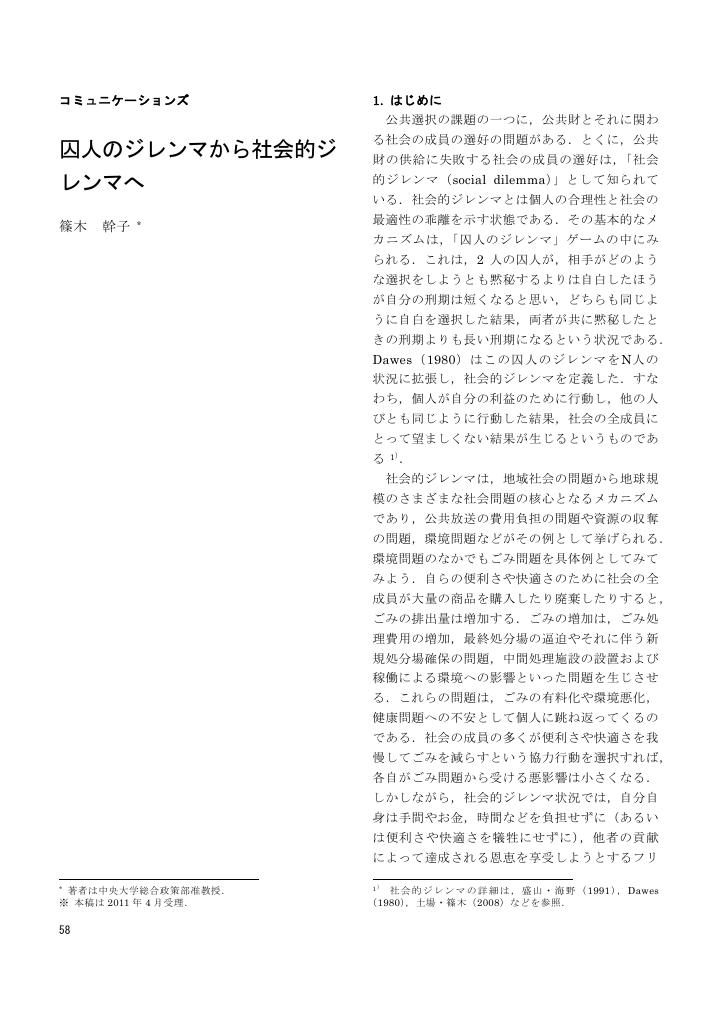2 0 0 0 OA リサイクル行動と正当化のメカニズム
- 著者
- 篠木 幹子
- 出版者
- The Japan Sociological Society
- 雑誌
- 社会学評論 (ISSN:00215414)
- 巻号頁・発行日
- vol.53, no.1, pp.85-100, 2002-06-30 (Released:2009-10-19)
- 参考文献数
- 22
- 被引用文献数
- 1
環境配慮行動の実行に前向きであるにもかかわらず, 環境配慮行動に取り組んでいない人々が現実には少なからず存在する.本稿では, リサイクル行動の中でも, ビン・缶のリサイクルと牛乳パックのリサイクルに焦点をあて, 態度と行動の間に矛盾を抱える個人のリサイクル不実行のメカニズムを検討する.ここでは, Diekmann and Preisendöfer (1998) によって提唱された3つの正当化の戦略 (注意変更戦略, 高コスト戦略, 主観的合理性戦略) を修正し, 新たに「行動貶化戦略」を加えて, 正当化に関する修正モデルが一般的な合理的選択理論のモデルの観点から捉え直せることを示した.次に, 各戦略に関する予測を導出し, 仙台市において実施した調査データを使用して分析を行い, 予測を検証した.その結果, 態度と行動の間に矛盾のある人の中で, 行動貶化戦略をとる人はほとんどいないことが明らかになった.また, 注意変更戦略に関しては, 正当化が行われる可能性を推測できるが, 明確な傾向は得られなかった.これに対して, コスト戦略, 主観的合理性戦略は, リサイクルの種類にかかわらず正当化が行われる傾向がみられた.
1 0 0 0 OA 学説研究と数理・計量社会学との対話
- 著者
- 篠木 幹子
- 出版者
- 東北社会学会
- 雑誌
- 社会学年報 (ISSN:02873133)
- 巻号頁・発行日
- vol.38, pp.1-3, 2009-07-19 (Released:2013-12-27)
- 参考文献数
- 2
1 0 0 0 OA 囚人のジレンマから社会的ジレンマへ
- 著者
- 篠木 幹子
- 出版者
- 公共選択学会
- 雑誌
- 公共選択の研究 (ISSN:02869624)
- 巻号頁・発行日
- vol.2011, no.56, pp.58-62, 2011-07-15 (Released:2014-07-13)
- 参考文献数
- 26
- 著者
- 篠木 幹子 木村 邦博
- 出版者
- Japanese Association For Mathematical Sociology
- 雑誌
- 理論と方法 (ISSN:09131442)
- 巻号頁・発行日
- vol.22, no.1, pp.49-70, 2007 (Released:2007-08-03)
- 参考文献数
- 53
- 被引用文献数
- 1
In Kimura and Shinoki (2007), after criticizing Diekmann and Preisendörfer's (1998; 2003) argument on the cognitive strategies to harmonize the discrepancy between attitudes and behaviors, we constructed a two-stage model of decision-making (rational choice) and justification (cognitive dissonance reduction) in a potential “social dilemma” situation, focusing on the problem of recycling. We deduced several propositions from our model and translated some of them into falsifiable predictions. In this paper, we analyze data from a social survey conducted in Sendai, Japan, in order to test these predictions: (1) On average, contributors' estimate of others' contribution is greater than non-contributors' estimate of others' contribution (the “false consensus effect”); (2) The proportion of the contributors who think that their marginal contribution plays a significant role in the well-functioning of the recycling system is greater than that of the non-contributors who think that their marginal contribution plays a significant role in the well-functioning of the recycling system; (3) On average, the normative consciousness concerning environmental problems is stronger among contributors than among non-contributors. We find that our predictions are almost supported. We also conduct a “critical experiment” in the natural settings on the mechanisms for the false consensus effect. The result reveals that our model is better than the selective exposure hypothesis in explaining it. We examine some possible objections to our model in order to consider what kind of research we need and to clarify the policy implication of our model.

